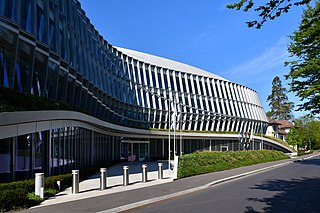
The International Olympic Committee is the international, non-governmental, sports governing body of the modern Olympic Games. Founded in 1894 by Pierre de Coubertin and Demetrios Vikelas, it is based in Lausanne, Switzerland. The IOC is the authority responsible for organizing the Summer, Winter, and Youth Olympics. The IOC also is the governing body of the National Olympic Committees (NOCs) and of the worldwide Olympic Movement, the IOC's term for all entities and individuals involved in the Olympic Games. As of 2020, 206 NOCs officially were recognized by the IOC. The IOC president has been Thomas Bach since 2013.

Frank "Frankie" Fredericks is a former track and field athlete from Namibia. Running in the 100 metres and 200 metres, he won four silver medals at the Olympic Games, making him Namibia's only Olympic medalist until Christine Mboma's silver medal at the 2020 Olympics in Tokyo. He also won gold medals at the World Championships, World Indoor Championships, All-Africa Games and Commonwealth Games. He is the world indoor record-holder for 200 metres, with a time of 19.92 seconds set in 1996.
World Athletics, formerly known as the International Amateur Athletic Federation and International Association of Athletics Federations and formerly abbreviated as the IAAF, is the international governing body for the sport of athletics, covering track and field, cross country running, road running, race walking, mountain running, and ultra running. Included in its charge is the standardization of rules and regulations for the sports, certification of athletic facilities, recognition and management of world records, and the organisation and sanctioning of athletics competitions, including the World Athletics Championships. The organisation's president is Sebastian Coe of the United Kingdom, who was elected to the four-year position in 2015 and re-elected in 2019 for a second four-year term, and then again in 2023 for a third four-year term.
Ekaterini Thanou, also known as Katerina Thanou, is a Greek former sprinter. She won numerous medals in the 100 metres, including an Olympic silver medal at the 2000 Summer Olympics in Sydney, Australia, while she was the 2002 European champion in Munich, Germany. She had also been crowned world and European champion in the 60 metres at the indoor championships.
Competitors at the Olympic Games have used banned athletic performance-enhancing drugs.
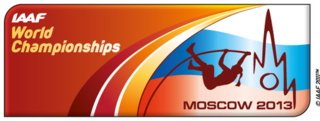
The 14th IAAF World Championships in Athletics was an international athletics competition held in Moscow, Russia, from 10 to 18 August 2013. Initially, Russia won the most gold medals to top the table for the first time since 2001. It was also the first time ever the host nation took the top of the medal table. However, following the disqualification of Russian sprinter Antonina Krivoshapka for doping and after the redistribution of medals in the Women's 4 × 400 metres relay, the United States moved to the top of the medal table with eight golds. In the overall medal count, the United States won 26 medals in total, followed by Kenya with 12. With 1,784 athletes from 203 countries it was the biggest single sports event of the year. The number of spectators for the evening sessions was 268,548 surpassing Daegu 2011.

Michael Jacob Beloff, KC is an English barrister and arbitrator. A member of Blackstone Chambers, he practises in a number of areas including human rights, administrative law and sports law.

Richard William Duncan Pound, better known as Dick Pound, is a Canadian swimming champion, lawyer, and spokesman for ethics in sport. He was the first president of the World Anti-Doping Agency and vice-president of the International Olympic Committee. He is currently the longest-serving member of the IOC.
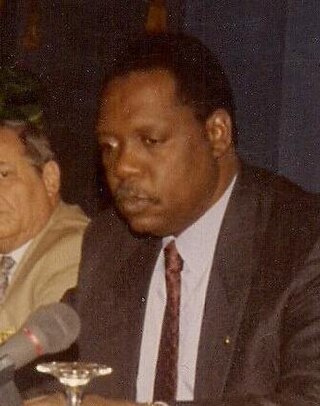
Issa Hayatou was a Cameroonian sports executive, athlete, and football administrator best known for serving as the president of the Confederation of African Football (CAF) between 1988 and 2017. He served as the acting FIFA president until 26 February 2016 as the previous president Sepp Blatter was banned from all football-related activities in 2015 as a part of the that year's FIFA corruption investigation. In 2002, he ran for president of FIFA but was defeated by Blatter. He was also a member of the International Olympic Committee (IOC).

Carlos Arthur Nuzman is a Brazilian lawyer and former volleyball player, having competed professionally from 1957 to 1972 and represented the national team between 1962 and 1968. Nuzman was part of the first Brazilian male volleyball team at the 1964 Summer Olympics, when the sport debuted at the Olympic Games. He later became an administrator, with the Brazilian Volleyball Confederation (CBV) and the International Olympic Committee (IOC). He was the leader of the Rio de Janeiro bid for the 2016 Summer Olympics and was subsequently appointed head of the Rio 2016 Organising Committee for the Olympic and Paralympic Games.

Primo Nebiolo was an Italian sports official, best known as former president of the worldwide athletics federation IAAF and the FISU.
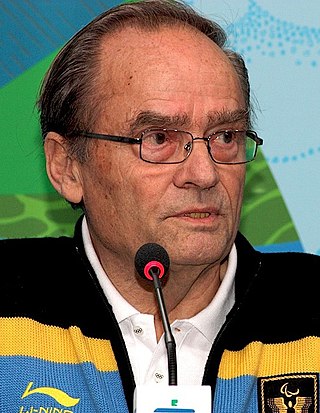
Arne Ljungqvist is a Swedish medical researcher, sports personality and retired high jumper. Ljungqvist is an honorary member of the International Olympic Committee (IOC), chairman of IOC's Medical Commission, and vice chairman of the World Anti-Doping Agency (WADA).
Hein Verbruggen was a Dutch sports administrator who was president of the Union Cycliste Internationale (UCI) from 1991 till 2005 and president of SportAccord from 2004 to 2013. He was an honorary member of the International Olympic Committee (IOC) since 2008. Previously, he was a member of the IOC and Chairman of the Coordination Commission for the Games of the XXIX Olympiad in Beijing in 2008. He is highly suspected to have protected Lance Armstrong.
Hamza Driouch is a Qatari track and field athlete. He was born in Guelmim, Morocco. In February 2015 it was announced that Driouch had been banned from athletics for two years for abnormalities in his biological passport profile.
The Russian Athletics Federation (RAF), previously named the All-Russia Athletic Federation, is the governing body for the sport of athletics in Russia. Its president is Dmitry Shlyakhtin.

Valentin Vasilyevich Balakhnichev is a Russian engineer and athletics coach and a former president of the All-Russia Athletic Federation. After investigations into corruption involving performance enhancing drug testing, Balakhnichev was banned for life by the IAAF.

Hajo Seppelt is a German journalist and author.
The McLaren Report is the name given to an independent report released in two parts by professor Richard McLaren into allegations and evidence of state-sponsored doping in Russia. It was commissioned by the World Anti-Doping Agency (WADA) in May 2016. In July 2016, McLaren presented the first part of the report, indicating systematic state-sponsored subversion of the drug testing processes by the government of Russia during and subsequent to the 2014 Winter Olympics in Sochi, Russia. In December 2016, he published the second part of the report on doping in Russia.
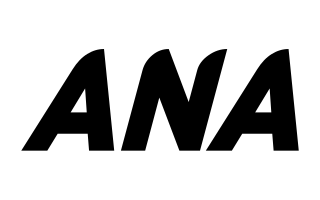
The Authorised Neutral Athletes are Russian athletes who are permitted to compete in the 2017 World Championships in Athletics by special permission, despite the IAAF's suspension of the Russian Athletic Federation. In order to compete, Russian athletes must demonstrate that they were not involved in the doping scandal that precipitated Russia's suspension from international athletics.
Systematic doping of Russian athletes has resulted in 51 Olympic medals stripped from Russia, four times the number of the next highest, and more than 30% of the global total. Russia has the most competitors who have been caught doping at the Olympic Games in the world, with more than 150.













